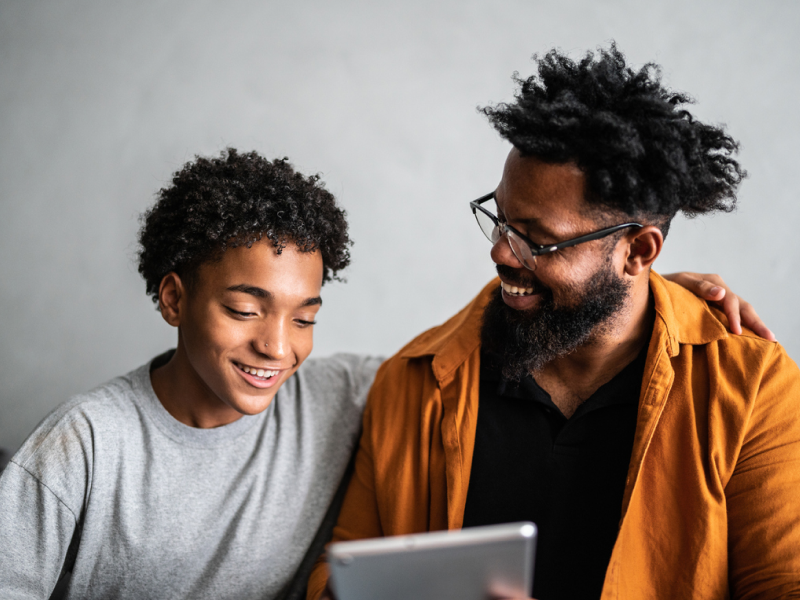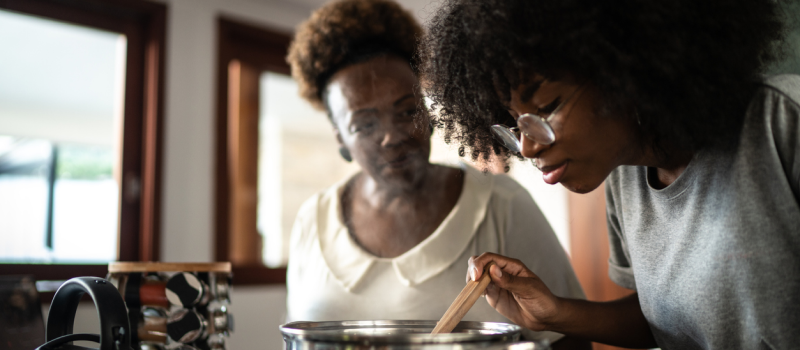
Table of Contents
Life Skills for Teens: How They Can Help & Where to Learn Them

Written By: Sarah duRivage-Jacobs

Clinically Reviewed By: Dr. Don Gasparini
June 13, 2023
8 min.
Developing life skills is an important part of growing up. Keep reading to learn about the most essential life skills for teens and why they’re important.
Learn more about our Clinical Review Process
Table of Contents
Adult tasks (aka “adulting”) are a reality of growing up. As people get older, they will need to learn soft and practical skills to complete certain tasks, maintain social norms in new settings, and make increasingly difficult decisions.
Although these skills are necessary for most people in adult life, they don’t come naturally. Young people must learn how to navigate different experiences, take on responsibilities, and other critical life skills.
What are the most essential life skills for teens? And where does someone go to learn them?
What are life skills for teens?
Maybe unsurprisingly, there’s no single definition for “life skills.” Life skills are commonly defined as “abilities for adaptive and positive behavior that enable individuals to deal effectively with the demands and challenges of everyday life.”
The World Health Organization reports that the following life skills are important for child and adolescent health and well-being:
Decision-making
Decision-making is important for young people because they need to know how to actively come to their own decisions and understand what may happen, including potential consequences, if certain decisions are made.
Problem-solving
Problem-solving is a constructive way to manage problems. When problems aren’t dealt with, they may lead to stress and even cause negative physical effects.
Creative thinking
Creative thinking helps people make decisions and solve problems. It allows people to explore the options and consequences—even beyond personal experience—whether they choose to act or not to act. Outside decisions, creative thinking helps with adaptation and flexibility in life.
Critical thinking
Critical thinking refers to the ability to objectively analyze information and experiences. It can help people recognize and assess the different factors that can have an effect on attitudes and behaviors, including personal values, peer pressure, and media portrayals.

Personalized treatment for complex mental health issues.
Healing teens & young adults from home.
Effective communication
Effective communication is the ability to express oneself, verbally as well as nonverbally, in line with someone’s culture and situation. This includes expressing opinions, desires, needs, and fears—and asking for advice and help when needed.
Interpersonal relationship skills
Interpersonal relationship skills help young people positively relate with the people in their lives. This includes making and keeping friendships, ending unhelpful relationships constructively, and maintaining good relationships with family members. These examples of positive interpersonal relationships can improve mental and social-wellbeing and provide social support.
Self-awareness
Self-awareness is the ability to recognize oneself, their character, strengths, weaknesses, desires, and dislikes. Self-awareness helps young people understand when they’re feeling stressed or under pressure. Good self-awareness supports effective communication, healthy interpersonal relationships, and building empathy for others.
Empathy
Empathy means being able to imagine what life could be like for someone else, even those who have different life circumstances and experiences. Empathy can help young people understand and accept people who are different from them and improve interactions with others. It can also help people develop nurturing feelings and behaviors for people.
Coping with emotions
When young people can cope with their emotions, they’re able to recognize their own and others’ emotions, understand how emotions impact behavior, and respond appropriately to emotions. Very intense emotions like anger can negatively affect health.
Coping with stress
When young people are able to cope with stress specifically, they’re able to recognize where stress is coming from, understand how it has an impact, and find ways to help control stress. This can mean using strategies for stress reduction or relaxation techniques to limit the hold stress has on people.
Social, emotional, and behavioral (SEB) skills
Social, emotional, and behavioral (SEB) skills refer to someone’s capacity to achieve and maintain healthy relationships, regulate their emotions, and manage behaviors that help them learn or meet their goals. SEB skills are different from traits because they’re related to capability rather than tendency.
Research demonstrates that developing SEB skills can lead to positive outcomes for young people. According to a 2022 paper, SEB skills can help young people get better grades, engage in school, maintain positive parental and social relationships, feel more accepted by their peers, and feel more satisfied in life.
The psychology researchers behind the concept of SEB skills organize them into five main categories: social engagement skills, cooperation skills, self-management skills, emotional resilience skills, and innovation skills.
Social engagement skills
The development of social engagement skills, which are often referred to as communication skills, can help people actively connect with others. Some common social engagement skills include:
- Leadership
- Persuasiveness
- Conversation
- Expression
Cooperation skills
Cooperation skills are social skills that can help people maintain positive interpersonal relationships, including the following:
- Teamwork
- Capacity for trust
- Taking perspective
- Capacity for social warmth
Self-management skills
Self-management skills can help people go after their goals and complete tasks. Here are some examples of self-management skills:
- Task management
- Time management
- Detail management
- Organizational
- Responsibility management
- Capacity for consistency
- Goal regulation
- Rule following
- Decision making
Emotional resilience skills
Emotional resilience skills can help people regulate their emotions and moods. Emotional resilience skills include the following:
- Stress regulation
- Capacity for optimism
- Anger management
- Confidence regulation
Innovation skills
Innovation skills can help people engage with new ideas and experiences Here are some examples:
- Abstract thinking
- Creativity
- Artisticness
- Cultural competence

Why do life skills matter for teens?
Many protective factors against mental and emotional disorders in adolescents involve developing life skills. Academic achievement (leading up to and through high school), emotional self-regulation, coping skills, problem-solving skills, and social engagement can all reduce the likelihood and impact of negative mental health outcomes.
Social, emotional, and behavioral development in adolescence
Understanding how adolescents develop socially, emotionally, and behaviorally can help us get a better sense of why SEB skills are so important. A lot of this comes down to brain changes.
By early adolescence, the brain has stopped growing in size—but it doesn’t finish developing until someone’s in their mid-to-late 20s. The prefrontal cortex, which controls planning, prioritizing, decision-making, and critical thinking, is one of the last parts of the brain to develop.
Adolescent brain changes open young people up to exploring new social experiences, evolving how they recognize and express their emotions, and trying new things. Here are some examples of social, emotional, and behavioral development typical for adolescents.
Social development
As adolescents get closer to becoming adults, their social lives broaden through the expansion of social circles, increasingly beyond the family, and the expansion of social roles, in which they take on more responsibility or enter into romantic partnerships. They will also often deepen their own self-awareness, increase awareness of how others feel, and begin to develop empathy.
Emotional development
Emotional development in adolescence is driven by biological changes in the brain and body and shaped by an individual’s situation and environment. They will begin to increase their ability to understand, assess, and manage their emotions. This ability will become more fine-tuned with time.
Behavioral development
The teen years are known as a time for pushing boundaries and taking behavioral risks, deemed as both positive (e.g., experimenting with new challenges) and negative (e.g., substance use, unsafe driving, “risky” sexual behavior). These behavioral changes are often associated with increased openness to uncertainty and brain differences like a heightened reward drive, a predisposition to impulsivity and seeking out new experiences, and less inhibition. The extent of risk-taking behavior in adolescents can also be influenced by social circles, emotional challenges, and adverse childhood experiences.
Join the Charlie Health Library
Get mental health updates, research, insights, and resources directly to your inbox.
You can unsubscribe anytime.
How teens can learn life skills
Learning and building life skills often begins earlier in childhood than adolescence. However, during adolescence, there continue to be opportunities for social, emotional, and behavioral growth in many different places—from the classroom to a therapist’s office. Here are some examples of places where teens can learn life skills.
Life skills-based learning in schools
Addressing the unmet mental health needs of young people has become a significant focus at schools. As a result, school-based programs for social and emotional learning have been proposed and implemented with the hopes of improving mental health outcomes.
Having a social and emotional life skills program in a school setting has been associated with:
- Less emotional distress
- More positive attitudes toward the self and others
- Better coping skills
- More resiliency
- Emotion identification (and reduced symptoms of depression and anxiety as a result)
- Reduced bullying
- Reduced aggression
Life skills-based group sessions and support groups
Group sessions and peer support groups can also help young people develop life skills. In both group sessions and peer support groups, individuals who share similar challenges or life circumstances come together to improve their mental health and benefit from social support.
Individual therapy
Many therapeutic modalities support people in developing and using life skills. Unlike group-based care models, individual therapy allows the patient and provider to identify the most important skills to learn and how best to achieve that.
Some therapeutic modalities focus on the development of specific skills. For example, dialectical behavioral therapy (DBT), an evidence-based treatment designed for people with borderline personality disorder, centers on skills including emotional regulation and interpersonal effectiveness.
Whatever modality someone decides to try, they can work with their therapist to set goals around life skills and make progress toward them throughout their sessions.
How to support your child through life skill development
Finding the right way to support life skill development for your child involves understanding what they need to learn, where gaps may be, and what would uniquely benefit the young person in your life.
Social and emotional learning should have been a part of your child’s education in earlier years. You can reach out to your child’s current and previous school administrations to see what programs have been or are in circulation. Regardless of what programs were available in schools, you always have the option to incorporate more life skills training in your child’s life. You can encourage positive problem-solving, creative thinking, critical thinking, effective communication, interpersonal relationship skills, self-awareness, empathy, and coping skills by assigning them responsibilities, talking openly about their experiences, and modeling positive relationships and communication. You can also turn to youth mental health programs like Charlie Health to reinforce life skills and support young people through challenging times.
As a parent, you can ensure your child has the resources they need to mature and develop healthily and happily. For more helpful resources on parenting, check out the dedicated section on our blog.




